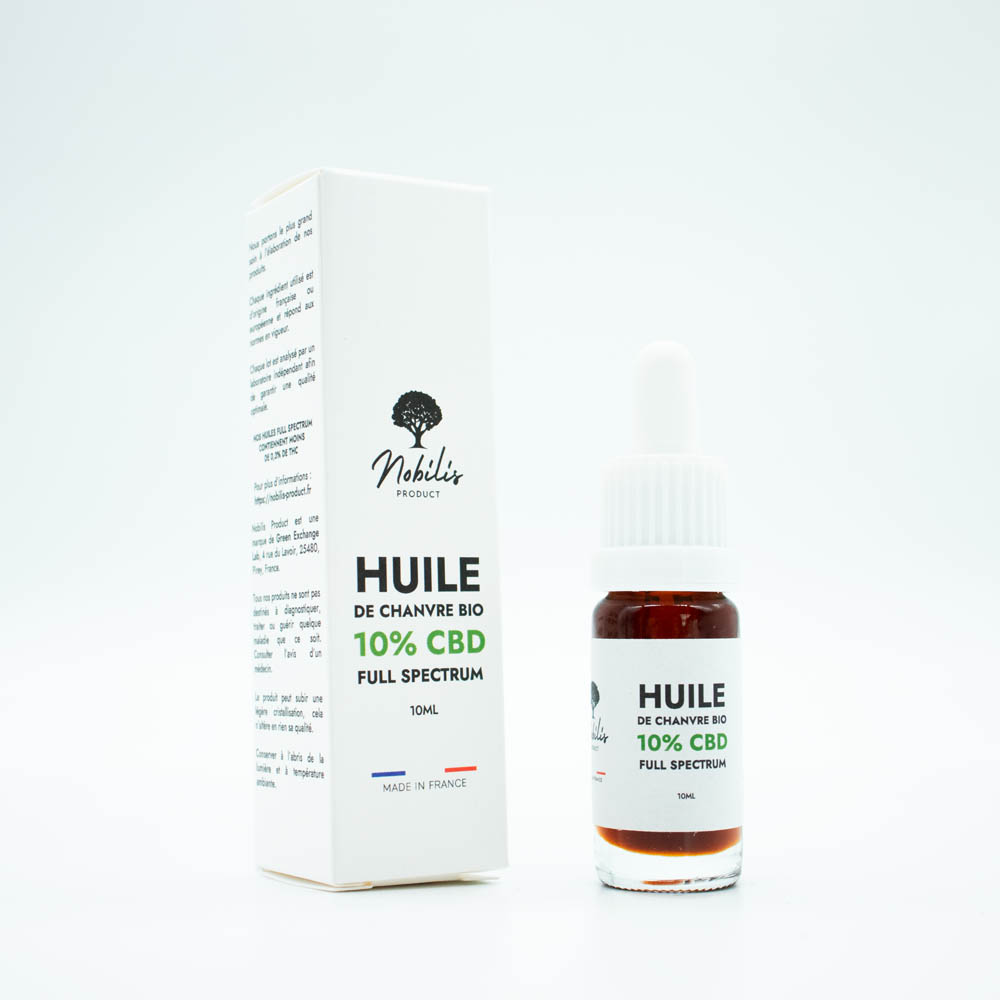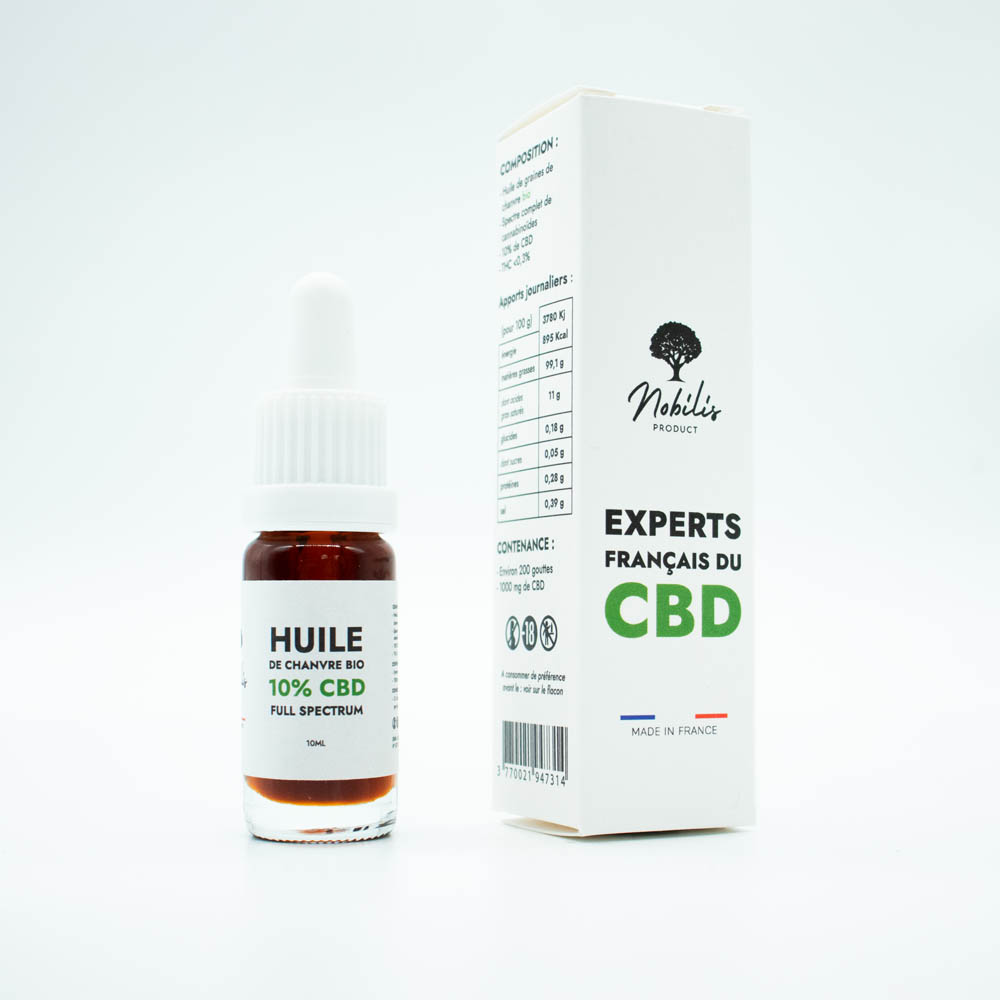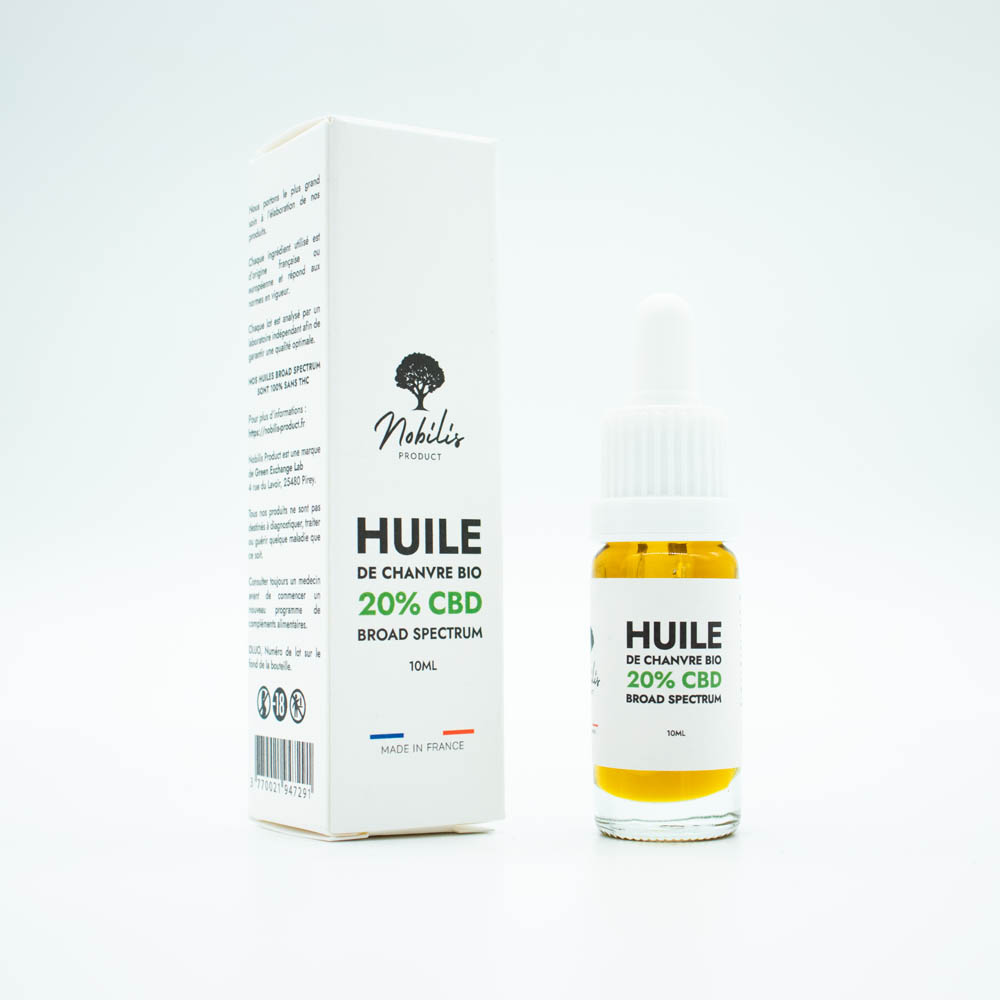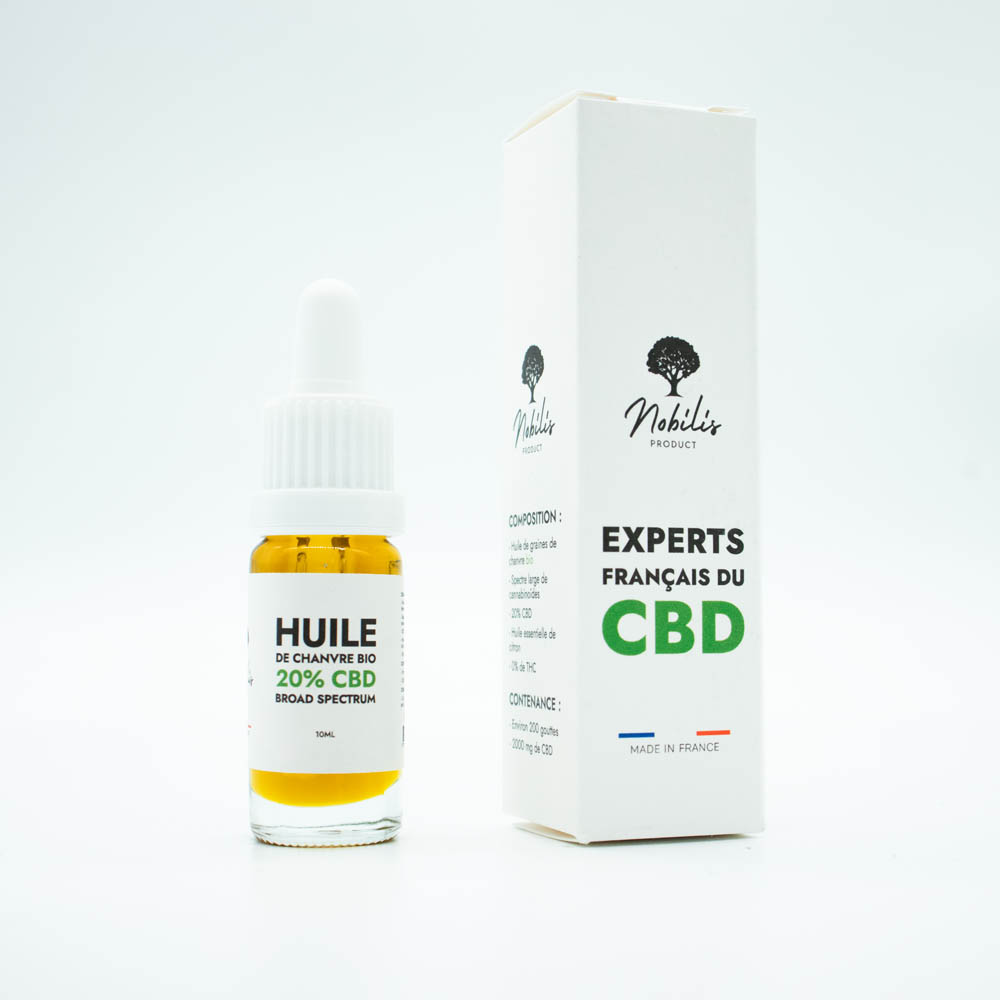Eczema is a benign skin condition, but a source of discomfort. What's more, it's difficult to cure completely, or to relieve its symptoms effectively without side effects.
However, since the discovery of cannabinoid receptors in the epidermis, the scientific sphere has been focusing on the search for a CBD-based treatment for various dermatoses, including eczema.
In this article, we take a look at what studies have been done about the possible benefits of CBD for eczema.
Table of contents
Eczema: causes, symptoms and treatments
What is eczema?
It is an inflammatory condition condition that causes the skin to dry out abnormally. The skin then becomes easily irritated, leading to redness and itching.
The manifestation of eczema is closely linked to to geneticsbut also and above all to the immune system. Indeed, atopic eczema (the most common form) is induced by an abnormal immune response (via inflammatory cytokines) triggered by an allergenic agent which may be found in hygiene products, cosmetics or wool clothing.
What's more, the the skin barrier of eczema sufferers is generally dysfunctional. In a way, it "lets through" irritants that penetrate and irritate the skin.
Certain environmental factors such as stress and temperature changes can also trigger or aggravate an eczema attack.
Symptoms
Eczema symptoms vary according to the type and severity of the condition. Dyshidrosic eczema, for example, manifests itself as small water blisters appearing on the hands and arches of the feet, while seborrheic eczema mainly affects the scalp.
However, here are the common symptoms associated with atopic eczema, which is the most common type:
- Dry skin that may be rough and prone to peeling;
- Redness, particularly during eczema flare-ups;
- Itching, which can aggravate the condition and lead to lesions if the person scratches excessively;
- Skin eruptions in the form of small bumps (papules), vesicles or plaques, which may develop on the affected skin. In the case of nummular eczema, these plaques resemble those of psoriasis. However, these two dermatitises should not be confused! Unlike eczema, psoriasis is autoimmune in origin;
- Finally, the skin may take on a darker or lighter hue where eczema develops.
What about treatments?
In most cases, eczema treatments aim to relieve symptoms (discomfort, itching) or control the allergic reaction.
Solutions commonly offered to patients include :
- Regular application of a moisturizing cream to preserve the skin barrier as much as possible;
- Topical corticosteroids indicated to relieve the inflammation and itching caused by the allergic reaction;
- Topical immunosuppressants to control the immune response and inflammation;
- Antihistamineswhose primary purpose is to relieve intense itching.
In certain cases, the doctor may suggest that the patient undergo cryotherapy (which involves exposing the skin to low temperatures), or light therapy. Antibiotics and antifungals may also be prescribed, particularly in the case of lesions.
What is the link between CBD and eczema?
If you're familiar with hemp and its constituents, then you know that cannabidiol (CBD) is potentially packed with health-giving benefits. However, it's not always obvious what the link is between a hemp molecule and eczema.
Here are a few clarifications.
The endocannabinoid system and CBD
CBD is all the rage because scientists discovered some thirty years ago that all animals have receptors with which hemp molecules like CBD can interact.
This set of receptors (CB1 and CB2) is known as the endocannabinoid system. Broadly speaking, its role is to maintain the body in a state of equilibrium (or homeostasis) by regulating several key physiological processes.
Our bodies naturally and spontaneously produce neurotransmitters which can also bind to these famous cannabinoid receptors: anandamide and 2-AG. However, for one reason or another, this may not be enough. This is known as "endocannabinoid deficiency".
According to scientists such as Dr. Ethan Russo, this deficiency is at the root of certain chronic illnesses such as rheumatism, migraine, diabetes and so on. And maybe even eczema!
The endocannabinoid system and the skin
Endocannabinoid receptors are found throughout the body. They are found in the brain, the intestine, the uterus and ... the epidermis. [1] That's why CBD is also being studied for psoriasis, an autoimmune skin disease.
Thus, this discovery suggests that topical application of CBD could have a targeted effect on the receptors of the endocannabinoid system and thus help restore the skin imbalance caused by eczema.
But that's not all. The link between CBD and eczema is also established by the fact that some studies show that people with this dermatitis have lower-than-average levels of anandamide and 2-AG. This observation supports Dr. Russo's endocannabinoid deficiency thesis.
Indeed, in this study [2], the scientists explain that "the endocannabinoid system (ECS) comprises a vast network of bioactive lipid mediators and their receptors, which modulate appetite, pain, mood and memory, and has recently been implicated in skin homeostasis. Disruption of SEC homeostasis is implicated in the pathogenesis of many common skin conditions."
We can therefore assume that an intake of cannabinoids (CBD in particular) could counteract the effects of this deficiency and thus reduce the incidence of eczema.
What are the potential benefits of CBD on eczema?
As we've just seen, the link between CBD and eczema is relatively well established. Let's now see what we know about its action and properties on the symptoms of this skin disease.
Anti-inflammatory properties
As we explained earlier, the formation of acne pimples is caused by excessive inflammation of the hair follicle.
The anti-inflammatory effects of CBD are well known, notably its beneficial action on neuronal inflammation (CBD is a treatment for epilepsy and pain caused by multiple sclerosis).
As far as the skin is concerned, some studies also reveal that CBD can reduce skin inflammation via its action on inflammatory cytokines (TNF-α and IL-1β), which are cell-signaling proteins involved in regulating the immune response and inflammation. [4]
Applying CBD to an acne pimple could promote rapid healing.
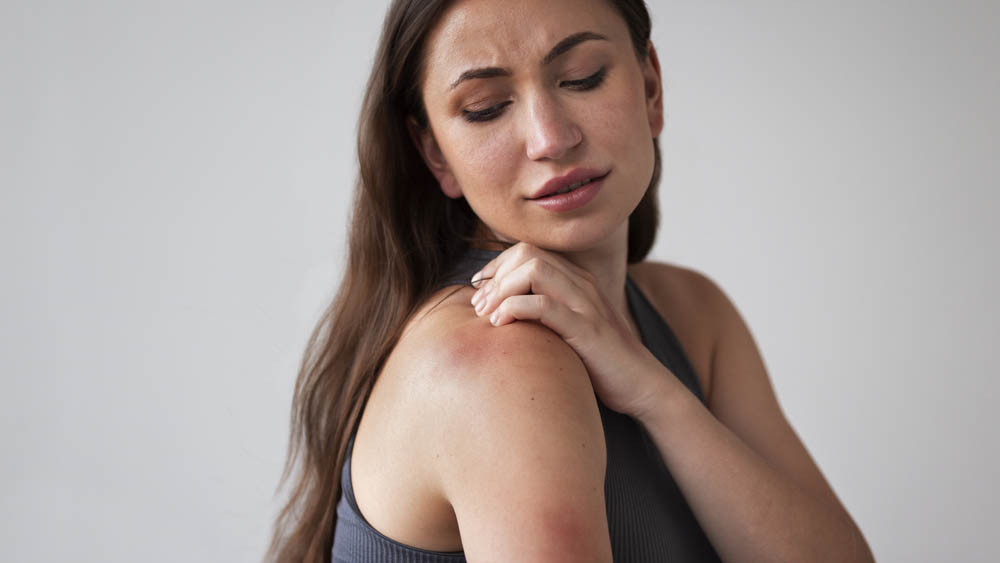
Anti-inflammatory effect
The redness and itching typical of eczema are caused by an abnormal inflammatory reaction. In fact, it overreacts to stimuli that would not normally trigger a significant response.
A study looking at the use of cannabis-based products for the treatment of inflammatory skin diseases concludes that: "Previous studies have revealed that these products are generally well tolerated and have shown promising results, for example in the treatment of atopic dermatitis, psoriasis and contact dermatitis."[3]
As a reminder, atopic dermatitis is the most common form of eczema. This suggests that CBD could potentially reduce the signs of inflammation caused by eczema.
However, we should point out that the scientists conclude that "further controlled human clinical trials are needed to fully discover the potential of these compounds and the possible side effects associated with their topical use."
Healing action
Inflammation of the skin can cause intense itching, leading to excessive scratching and even scarring.
On this subject, a study carried out on 20 people suffering from either psoriasis or eczema analyzed the effect of a CBD-enriched ointment on scars caused by these two skin conditions.
The team concludes, "Based on skin assessments (hydration, TEWL, elasticity), clinical questionnaires (SCORAD, ADI, PASI) and supported by photographic data and the investigators' clinical assessment, the results showed that topical treatment with a CBD-enriched ointment significantly improved the skin."[4]
Of course, large-scale studies are needed before CBD's healing properties can be scientifically proven. But these results do suggest that CBD may be effective.
Anti-stress properties
As we've mentioned, stress can worsen eczema symptoms in some people, and even trigger flare-ups. In this sense, CBD could help patients who observe an upsurge in symptoms during periods of stress.
Indeed, as you may know, CBD is particularly appreciated for its relaxing properties. On a daily basis, it helps many people cope with stressful days and reduce any associated symptoms such as insomnia, anxiety and even depression. [5]
Studies have indeed shown that CBD is capable of acting on the synthesis of serotonin, a hormone linked to a state of serenity. This could be beneficial in reducing the frequency and intensity of eczema attacks triggered by stress.
How to use CBD for eczema?
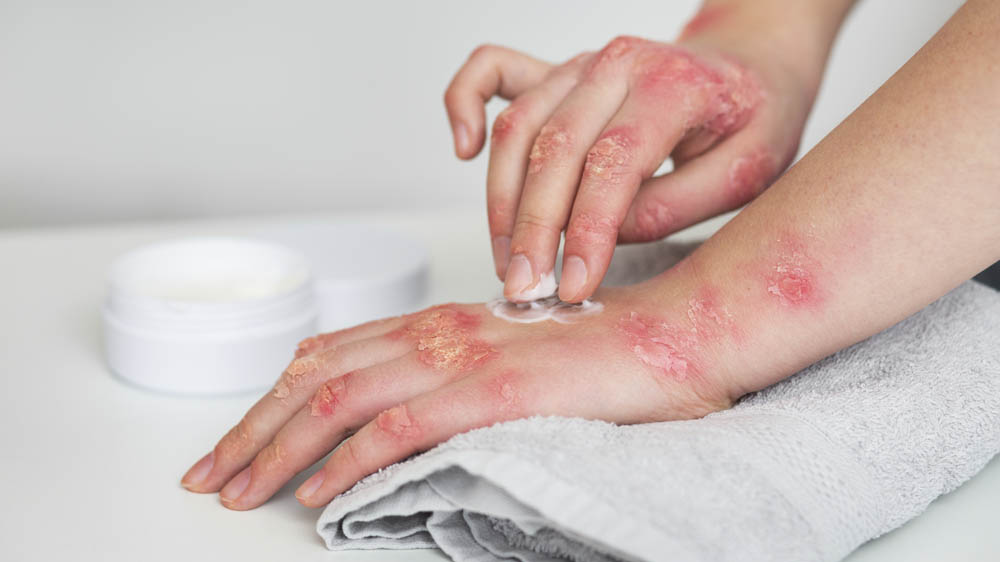
Now that you know to what extent CBD can help improve your eczema, the question is how best to use it to enjoy all its potential benefits. Here are a few tips.
Which CBD product?
Since eczema-prone skin is extremely sensitive, we recommend that you prioritize the purchase of a cream enriched with CBD enriched cream specially formulated for this type of condition.
However, you can also use CBD oil directly, and more specifically hemp seed oil enriched with CBD. Hemp seeds are rich in skin nutrients (omega 3 and 6). Applying CBD oil can therefore help to strengthen the skin barrier in addition to all the potential benefits we mentioned earlier.
However, be sure to choose a quality CBD oil, if possible, organically grown. Ask for laboratory analysis to ensure that the product contains no traces of substances that could potentially irritate your skin.
-
CBD Oil 10% Full Spectrum - Nobilis Product
Rating 4.75 out of 524,90 €Discover our Full Spectrum 10% CBD oil from hemp grown in France, without additives or GMOs. Its richness in cannabinoids and terpenes guarantees an optimal surrounding effect for deep relaxation and natural well-being. Practical 10 ml bottle with pipette for precise dosage.
Our Full Spectrum 10% CBD oil is :
🇫🇷 Manufactured from A to Z (from hemp extraction to bottling) in our French laboratory.
🧪 Made with CBD crude to provide all the cannabinoids, flavonoids and terpenes.
✅ Analyzed by an independent laboratory for each batch to guarantee quality.
-
Broad Spectrum 20% CBD Oil - THC-free
Rating 5.00 out of 529,90 €Opt for our Broad Spectrum 20% CBD oil, a higher concentration for more powerful soothing and relaxing effects. Perfect for those seeking optimal relief from the natural THC-free benefits of CBD.
Our Broad Spectrum 20% CBD oil is :
🇫🇷 Manufactured from A to Z (from hemp extraction to bottling) in our French laboratory.
🧪 Made with CBD distillate to provide all the cannabinoids except THC.
✅ Analyzed by an independent laboratory for each batch to guarantee quality
What dosage?
If you opt for a cream or balm specially designed for eczema-prone skin, then follow the instructions on the packaging.
In the case of CBD oil, massage a few dropsdirectly onto the affected area. Repeat as often as necessary.
If you want to take advantage of CBD's anti-stress effects, then we recommend you buy a low-concentration CBD oil (between 5 and 10%) and start by taking 3 to 5 drops a day. Gradually increase the dosage until you achieve the desired relaxing effects.
Precautions and contraindications
Before applying CBD (whether in cream or oil form), we suggest you speak to a dermatologist. This skin specialist will be able to advise you better than anyone else. It's also a good idea to carry out an allergy test on a small area to check that CBD won't irritate your sensitive skin.
We'd also like to remind you that it's vital to choose a high-quality product that contains only natural, organic ingredients.
CBD and eczema: what results can I expect?
As we've seen, CBD is potentially capable of offering a number of benefits for eczema-prone skin. In addition to reducing inflammation and itching, it may also promote healing. Taken orally, it may also act on one of the causes of eczema: stress.
Thus, many eczema sufferers report that CBD helps them manage the associated symptoms and even, reduce the intensity of attacks.
However, results may vary from person to person, as eczema symptoms may be more or less intense depending on the patient. It should also be noted that some individuals are more sensitive to the effects of CBD than others. This depends, among other things, on the number of endocannabinoid receptors present on the skin's surface.
Our sources
[1] Therapeutic Potential of Cannabidiol (CBD) for Skin Health and Disorders (PubMed)
[2] The endocannabinoid system and its role in eczematous dermatoses (PubMed)
[3] Cannabis-based products for the treatment of inflammatory skin diseases: a timely review (PubMed)
[4] A therapeutic effect of cbd-enriched ointment in inflammatory skin diseases and cutaneous scars (PubMed)

